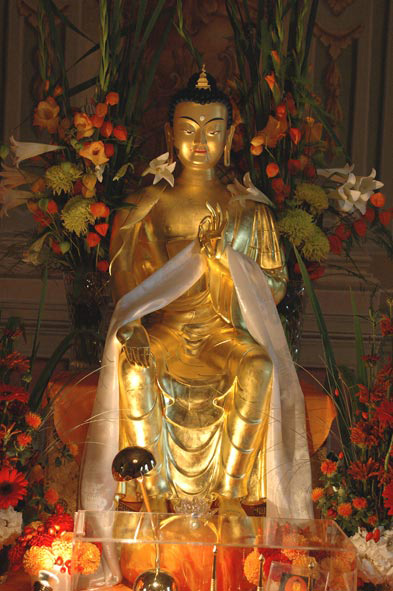 People are social beings. We all have the need to socialize with other people, to share our experiences and thoughts, to dedicate ourselves to each other. Making the best of yourself takes a lot of energy from anyone. Nowadays, when the world is all about materialism and success, having someone who can give you direction in your everyday life seems very important.
People are social beings. We all have the need to socialize with other people, to share our experiences and thoughts, to dedicate ourselves to each other. Making the best of yourself takes a lot of energy from anyone. Nowadays, when the world is all about materialism and success, having someone who can give you direction in your everyday life seems very important.
The challenge in balancing our family, work and other social spheres is very difficult, and belief in something bigger and stronger than us offers us some reassurance and relief that we can refer our worries to someone else and thereby increase our chances for happiness.
In The Triangular Theory of Love, relationship theorist Robert Sternberg defines three elements of relationships which combine in different ways in the many different types of relationships we have. Those three elements are: passion, intimacy, and commitment. Passion is the sense of feeling overwhelmed with physical attraction and intense emotional arousal. Intimacy refers to a sense of emotional closeness, comfort, and support between two people. The third and most enduring element, commitment, is the choice to be dedicated to a relationship, the pledge to preserve it for the long-term.
In Peoples Temple, as well in many other new religious movements, the third element of commitment is the one which drives people to act within the framework of their organization as they do and – in the case of Jonestown – to make the final decision that they did.
I understand all those people who just wanted to escape from cruel reality to a wonderland with a person who gave the impression that he could control everything. Having a lot of issues in your life, not really knowing which direction to take, feeling unable to help yourself to confront life’s problems, these are all factors which leaders such as Jim Jones recognize as they attract new members.
As a student I visited three well-known new religious movements in Slovenia whose memberships are quite large. All of them give a unique religious perspective on the world around us.
The first is the new religious movement called The Family. Established in 1968 and initially known as Children of God, their foundation is very similar as many other Protestant groups in that they accept a literal reading of the Bible. Like Peoples Temple, they live a communal life. Unlike many religious groups, including the Temple, they consider sexual relations to be free of marriage and not only – or even primarily – for reproductive purposes. In Slovenia, we say they have very liberal views. But these practices have created controversy for this movement over the years. In the seventies, there were reports of so-called Flirty Fishing, in which young attractive girls would go out in public and use their sex appeal to entice males to join their community. They defended their practices, though, by comparing themselves to Jesus Christ who was also known as a fisherman casting his own net for new members.
 The second group is the Dharmaling Buddhist Congregation. This community is based on, and dedicated to, Buddhism. They are very tolerant of other religious communities, as long as they support nonviolent life. As compared to the Family, they have lived their lives free of controversy.
The second group is the Dharmaling Buddhist Congregation. This community is based on, and dedicated to, Buddhism. They are very tolerant of other religious communities, as long as they support nonviolent life. As compared to the Family, they have lived their lives free of controversy.
The third new religious movement which has found a following in Slovenia is Hare Krishna. Their culture was founded in the late 15th century and has roots in Hinduism. Their lives are governed by four tenets: mercy (in respect of all beings, they do not eat meat), strictness (they do not smoke or use drugs), purity (they consider sexual intercourse only in a matter for reproduction), and truthfulness (they do not gamble). When my class visited the Hare Krishna, we all felt the positive vibration and the sense of solidarity amongst the members of this community. Everyone we met was highly educated with jobs outside the community, but they met every day for prayer and other religious activities.
What do these groups have in common with Peoples Temple? They all have a strong commitment to community life, a well-developed sense of unity and solidarity, a belief in something bigger than themselves, and a hope for a better life.
Peoples Temple ended in violence, because of its isolation from outside world. If Temple members had had a normal life – even the relatively normal life of these other groups – if they considered their group just as their shelter and a place for a respite from the world, but not completely apart from the world, I am sure that they would not have ended the way they did.
Dedication to a belief, to a group, to a person, to any kind of relationship, is something special and necessary to make each of us whole. But we need not go to extremes.
From my point of view, every religious movement has something special, something that attracts others to join them. What is most important is that you do not leave normal life and social contact, and live solely for the group. That is how you still remain yourself, how you can remain open to others outside the group who can warn you if something seems suspicious to them. This was not present in Jonestown. The social isolation became the strongest factor in their lives, and ultimately, the fatal one.
(Manca Konjedic lives in Kranj, Slovenia and is a regular contributor to the jonestown report. Her previous articles are here.)